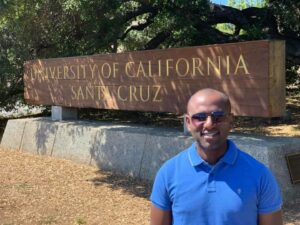Meet Our Wadsworth International Fellows: Camille Louis
 This month we return to our series spotlighting Wadsworth International Fellows as we introduce you to Camille Louis, who received a Wadsworth International Fellowship which has given him the opportunity to train in archaeology at the University of California, Santa Cruz, CA, supervised by Dr. James Cameron Monroe.
This month we return to our series spotlighting Wadsworth International Fellows as we introduce you to Camille Louis, who received a Wadsworth International Fellowship which has given him the opportunity to train in archaeology at the University of California, Santa Cruz, CA, supervised by Dr. James Cameron Monroe.
I received my undergraduate degrees in Art History, Archaeology and psychology from the Université d’Etat d’Haïti. Later I spent a year at the University of the West Indies (Mona Campus, Jamaica) where I received archaeological training organized by members of the Department of Archaeology at Monticello (Virginia, USA), one of the preeminent groups exploring the archaeology of slavery in the New World. I earned a Master’s Degree in Cultural Resources Management from Taipei National University of the Arts in Taiwan. Following my master’s degree, I received specialized training in underwater archaeology from UNESCO and the University of Leiden team in St-Eustatius.
The Haitian Revolution created a total cultural and social “rupture”. Slaves, free blacks, and some mulattoes united against and overthrew the colonial system. During the revolution, opposing armies of the French and the enslaved destroyed innumerable colonial settlements and plantations, the remnants of which can be studied archaeologically. My academic interests are to study the nature of Maroon settlement and the organization of plantations in Dondon region Northern Haiti, and the cultural memory of such communities in the region today. This area was a hotbed of maroon settlement in the colonial period, and played a determinative role in sparking the Haitian Revolution in 1791. Rather than viewing Maroons as isolated and removed from the plantation world, I seek to explore how they were intensely entangled in colonial world-making processes, revealing the active role these “people without history” played in the making of the modern world. This research has the potential to provide new insights into the communication networks that fostered revolution in Saint-Domingue, and provide a valuable perspective on archaeologies of power and resistance more broadly. Finally it focuses on the relationship between Dondon’s community and heritage of the colonial period.
The University of California at Santa Cruz provides a unique professional development opportunity to acquire expertise in Historical Archaeology based in Haiti. Since 2015 Dr. Cameron Monroe of the Department of Anthropology at UC Santa Cruz has been carrying out research in Milot the Northern region of Haiti, which has afforded me the opportunity to pursue my PhD program at this University.